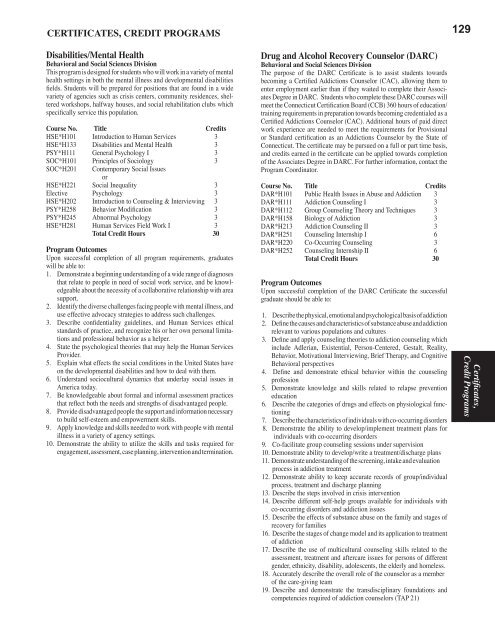Catalog 2010 - Naugatuck Valley Community College - Connecticut ...
Catalog 2010 - Naugatuck Valley Community College - Connecticut ...
Catalog 2010 - Naugatuck Valley Community College - Connecticut ...
You also want an ePaper? Increase the reach of your titles
YUMPU automatically turns print PDFs into web optimized ePapers that Google loves.
CertifiCateS, CreDit ProgramS<br />
Disabilities/mental Health<br />
Behavioral and Social Sciences Division<br />
This program is designed for students who will work in a variety of mental<br />
health settings in both the mental illness and developmental disabilities<br />
fields. Students will be prepared for positions that are found in a wide<br />
variety of agencies such as crisis centers, community residences, sheltered<br />
workshops, halfway houses, and social rehabilitation clubs which<br />
specifically service this population.<br />
Course No. title Credits<br />
hSE*h101 Introduction to human Services 3<br />
hSE*h133 Disabilities and Mental health 3<br />
PSY*h111 General Psychology I 3<br />
SOC*h101 Principles of Sociology 3<br />
SOC*h201 Contemporary Social Issues<br />
or<br />
hSE*h221 Social Inequality 3<br />
Elective Psychology 3<br />
hSE*h202 Introduction to Counseling & Interviewing 3<br />
PSY*h258 Behavior Modification 3<br />
PSY*h245 Abnormal Psychology 3<br />
hSE*h281 human Services Field Work I 3<br />
total Credit Hours 30<br />
Program outcomes<br />
Upon successful completion of all program requirements, graduates<br />
will be able to:<br />
1. Demonstrate a beginning understanding of a wide range of diagnoses<br />
that relate to people in need of social work service, and be knowledgeable<br />
about the necessity of a collaborative relationship with area<br />
support.<br />
2. Identify the diverse challenges facing people with mental illness, and<br />
use effective advocacy strategies to address such challenges.<br />
3. Describe confidentiality guidelines, and human Services ethical<br />
standards of practice, and recognize his or her own personal limitations<br />
and professional behavior as a helper.<br />
4. State the psychological theories that may help the human Services<br />
Provider.<br />
5. Explain what effects the social conditions in the United States have<br />
on the developmental disabilities and how to deal with them.<br />
6. Understand sociocultural dynamics that underlay social issues in<br />
America today.<br />
7. Be knowledgeable about formal and informal assessment practices<br />
that reflect both the needs and strengths of disadvantaged people.<br />
8. Provide disadvantaged people the support and information necessary<br />
to build self-esteem and empowerment skills.<br />
9. Apply knowledge and skills needed to work with people with mental<br />
illness in a variety of agency settings.<br />
10. Demonstrate the ability to utilize the skills and tasks required for<br />
engagement, assessment, case planning, intervention and termination.<br />
Drug and alcohol recovery Counselor (DarC)<br />
Behavioral and Social Sciences Division<br />
The purpose of the DARC Certificate is to assist students towards<br />
becoming a Certified Addictions Counselor (CAC), allowing them to<br />
enter employment earlier than if they waited to complete their Associates<br />
Degree in DARC. Students who complete these DARC courses will<br />
meet the <strong>Connecticut</strong> Certification Board (CCB) 360 hours of education/<br />
training requirements in preparation towards becoming credentialed as a<br />
Certified Addictions Counselor (CAC). Additional hours of paid direct<br />
work experience are needed to meet the requirements for Provisional<br />
or Standard certification as an Addictions Counselor by the State of<br />
<strong>Connecticut</strong>. The certificate may be pursued on a full or part time basis,<br />
and credits earned in the certificate can be applied towards completion<br />
of the Associates Degree in DARC. For further information, contact the<br />
Program Coordinator.<br />
Course No. title Credits<br />
DAR*h101 Public health Issues in Abuse and Addiction 3<br />
DAR*h111 Addiction Counseling I 3<br />
DAR*h112 Group Counseling Theory and Techniques 3<br />
DAR*h158 Biology of Addiction 3<br />
DAR*h213 Addiction Counseling II 3<br />
DAR*h251 Counseling Internship I 6<br />
DAR*h220 Co-Occurring Counseling 3<br />
DAR*h252 Counseling Internship II 6<br />
total Credit Hours 30<br />
Program outcomes<br />
Upon successful completion of the DARC Certificate the successful<br />
graduate should be able to:<br />
1. Describe the physical, emotional and psychological basis of addiction<br />
2. Define the causes and characteristics of substance abuse and addiction<br />
relevant to various populations and cultures<br />
3. Define and apply counseling theories to addiction counseling which<br />
include Adlerian, Existential, Person-Centered, Gestalt, Reality,<br />
Behavior, Motivational Interviewing, Brief Therapy, and Cognitive<br />
Behavioral perspectives<br />
4. Define and demonstrate ethical behavior within the counseling<br />
profession<br />
5. Demonstrate knowledge and skills related to relapse prevention<br />
education<br />
6. Describe the categories of drugs and effects on physiological functioning<br />
7. Describe the characteristics of individuals with co-occurring disorders<br />
8. Demonstrate the ability to develop/implement treatment plans for<br />
individuals with co-occurring disorders<br />
9. Co-facilitate group counseling sessions under supervision<br />
10. Demonstrate ability to develop/write a treatment/discharge plans<br />
11. Demonstrate understanding of the screening, intake and evaluation<br />
process in addiction treatment<br />
12. Demonstrate ability to keep accurate records of group/individual<br />
process, treatment and discharge planning<br />
13. Describe the steps involved in crisis intervention<br />
14. Describe different self-help groups available for individuals with<br />
co-occurring disorders and addiction issues<br />
15. Describe the effects of substance abuse on the family and stages of<br />
recovery for families<br />
16. Describe the stages of change model and its application to treatment<br />
of addiction<br />
17. Describe the use of multicultural counseling skills related to the<br />
assessment, treatment and aftercare issues for persons of different<br />
gender, ethnicity, disability, adolescents, the elderly and homeless.<br />
18. Accurately describe the overall role of the counselor as a member<br />
of the care-giving team<br />
19. Describe and demonstrate the transdisciplinary foundations and<br />
competencies required of addiction counselors (TAP 21)<br />
129<br />
Certificates,<br />
Credit Programs


